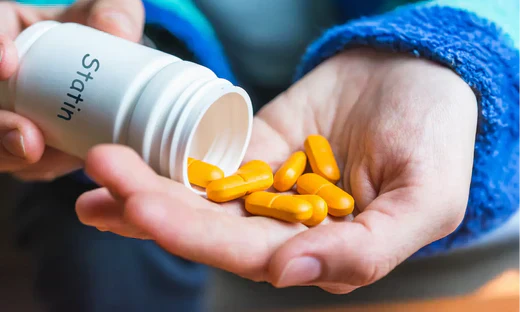Estimated Reading Time: 4 minutes
|Cholesterol is a concern for many people due to its potential impact on health. I am sure you must also know somebody in your family who suffers from this problem. High levels of bad cholesterol may contribute to an increased risk of heart disease, kidney problems, and cognitive decline. But this is not the end of it because even treatment or medication for cholesterol can lead to several complications. That's right. Statin drugs, while effective in managing cholesterol levels, may have side effects that some people find difficult to manage.
People taking this medication are always looking for something to manage its side effects. For those of you who don't know, geranylgeraniol (GG) may play a role in helping manage Statin medication-induced myopathy. Let's get into the details of it in the following section.
What Is Myopathy?
Myopathy, in the simplest terms, means disease of skeletal muscles. This means it impacts all the muscles that are connected to your bones. The condition can be acute or chronic depending on several factors. Myopathy can also be congenital which means something that you might be born with. It can also be acquired through the use of medications or treatments, infection, injury, or probably a disease such as rheumatoid arthritis, diabetes, and hypothyroidism. But we are going to focus strictly on acquired myopathy which is due to the use of Statin medication.
Statin medication for cholesterol may be associated with myopathy, a term used to describe diseases of skeletal muscle. The potential side effects of cholesterol medication may include muscle pain, weakness, coordination issues, improper functioning of certain structural components of your muscles, and a negative impact on muscle fibers, among others. Some negative effects of this medication can be progressive which means they will get worse over time. On the other hand, some side effects can be short-lived and can be managed more easily.
Experts also suggest that myopathy can be inherited. There are more than 200 types of inherited myopathies in human beings. These affect one person out of every 6,000 people in the world.
Geranylgeraniol may support the management of acquired myopathy, which can affect musculoskeletal health and may cause other various problems of the musculoskeletal structure.
What Are The Most Commonly Acquired Myopathies?
Autoimmune Myopathy
If you complain of inflammatory muscle injury or muscle degeneration, it could be because of autoimmune myopathy. In this situation, your body attacks its own healthy tissues and cells. Such conditions include lupus, rheumatoid arthritis, dermatomyositis, and a few more.
Toxic Myopathy
This happens due to an injury caused in a muscle as a result of a toxin or medication. Examples are alcohol, steroids, iodine, niacin, propofol, and many more.
Endocrine Myopathy
This kind of myopathy happens due to a disorder in the hormonal system that may impact muscle function. Thyroid disease and diabetes are a few examples.
Infectious Myopathy
Diseases and viral infections such as HIV, influenza, or Lyme disease can cause this kind of myopathy which prevents your muscles from functioning properly.
Nutritional Myopathy
You may suffer from this problem due to a deficiency in vitamin D, vitamin B12, and also electrolytes such as potassium which may lead to interference with your muscle function.
Myositis Ossificans
If you complain about calcium deposits forming in your muscles after an injury, you may suffer from this problem. The muscles of your thighs or upper arm may experience pain and reduced range of motion.
Rhabdomyolysis
In this condition, skeletal muscle breaks down rapidly due to damage which results in pain, weakness, and also irregular heartbeat. It can be a result of cholesterol medication, substance abuse, rigorous exercise, and also a crush injury.
Common Symptoms Of Myopathy Acquired After Statin Treatment/Cholesterol Medication Include
- Weakness in your muscles or constant fatigue and tiredness
- Pain in your muscles
- Stiffness or clenched feeling in muscles
- Cramps or sudden twitches
- Problems in standing or walking
- Trouble during exercise
- Trouble in deep-breathing
- Problems in swallowing

The Biggest Reason To Consume GG For Statin Side Effects
Geranylgeraniol has been abbreviated as GG for your convenience. Statin medicine when taken regularly depletes the CoQ10 enzyme in your body. Consuming enough geranylgeraniol supplement helps replenish it efficiently. The human body is capable of producing its own CoQ10. It is essential for several healthy muscle functions. But yes, when you are going through the satin treatment, it interferes with the functions of the body which prevents it from using the enzymes to synthesize CoQ10.
Geranylgeraniol is a key substrate that may support the synthesis of CoQ10. And, a study suggests that supplementing with geranylgeraniol regularly may help manage the side effects of Statin therapy. Because it helps in the production and synthesis of CoQ10 naturally, it may help boost healthy muscular function. However, more studies are underway in this direction.
The right/correctly measured dosage of a GG health supplement may help various biological systems within the human body. This means that it may not just benefit your skeletomuscular system only. A few emerging research studies indicate that GG supplementation may support broader biological functions, including muscle and bone health that may lead to healthy aging. If you are considering going for a supplement that helps you replenish your CoQ10 stores naturally, this is the right time to do that.
You do not have to wait for the symptoms of myopathy to show. You may consider supplementing with GG, as studies suggest it may support hormone levels, muscle mass, strength, bone health, and gut health in the long run. Wellness Extract always advises you to invest in the right geranylgeraniol supplement to improve your overall health and lead a happy life.
Disclaimer: These statements have not been assessed by the FDA. The information contained within this page is for educational purposes only. It is not intended to replace the advice or attention of health care professionals.






































5